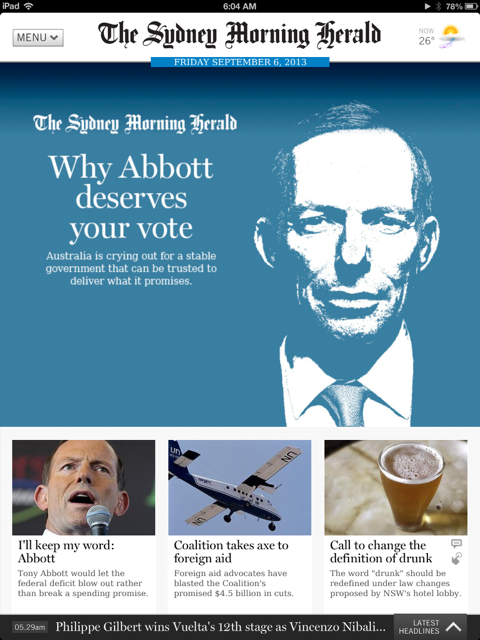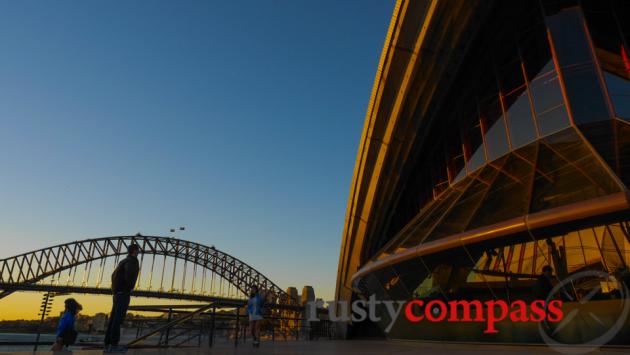By mid-afternoon, the skies around western Sydney were darkened by smoke. Radio shifted its focus to regular fire updates. Bushland around the city was ablaze. Sydney's bushfire season had begun - just days after the end of winter.
By now, people the world over have experienced climate change first hand. Even most climate change deniers know that the weather is changing. They've shifted their rhetoric to disputing the causes of climate change rather than challenging its existence.
Australia has been sent some especially strong signals of what a changing climate feels like. Severe drought saw east coast reservoirs dry up in the middle of the first decade of the new millennium. In 2013, Australia has experienced its hottest day, and hottest month on record. 2013 may well end up being the hottest year on record too.
Despite the visceral awareness of climate change, or perhaps because of it, denialism in Australia is stronger than ever. As the anecdotal evidence piles up in support of decades of warnings by the world's most eminent climate experts, Australians are less inclined to do much about the problem.
Just three days before my recent return to a hot, windy, early spring Sydney, Tony Abbott was elected Prime Minister of Australia. He had convincingly defeated the Labor Government on a platform of axing a tax on carbon emissions and stopping boats.
"Stop the boats" and "axe the tax" he said with mind-numbing frequency over two years of campaigning - never pausing to add any substance to his plans. And it won him Australia's top job.
The messaging for both slogans is bound up with denial. In the case of climate, it's a denial that there is a pressing need for action. In the case of asylum seekers, the slogan first denies the humanity of the people ready to risk all to reach Australia's shores, and then, Australia's geography in Asia and proximity to Indonesia.
Indonesia is both a fellow destination of asylum seekers and an emerging regional economic, strategic and military powerhouse.

Abbott managed to convince the majority of Australians that the climatic inheritance of their offspring was less important than an alleged hit to their wallets. The recently introduced carbon tax had at once reduced emissions and barely impacted on the cost of living, but that didn't warrant attention in the election campaign and it didn't diminish Abbott's scaremongering.
Pumped up by the Murdoch press and a gaggle of squealing shock-jocks, Abbott's catastrophising about a predicted surge in the price of everything following the implementation of a carbon tax, was well received in key marginal electorates. The fact that it was proven to be baseless didn't matter.
Australians have good reason for denying climate change. We're among the world's worst per-capita polluters and a leading exporter of fossil fuels. Those are two facts conservative politicians are reluctant to share with their constituents.
Abbott and his new Environment Minister, Greg Hunt, prefer to focus on Australia's small contribution to gross global carbon emissions. They point the finger at developing economies like China and India whose emissions are rising rapidly, in line with their economic development. Implicit in their charge is the idea that Chinese and Indians, whose per-capita emissions are a fraction of Australia's, have a lesser right to the same carbon intensive economic prosperity as the developed world.
In his first week in the job Greg Hunt got straight to work. He shut down the Climate Council, a provider of independent advice to government on climate change; the Clean Energy Finance Corporation, a Government-funded investment partner in renewable energy projects; and pledged to repeal the carbon tax. Returning to a favorite riff, he noted that "The most heartening development in the last two years has been China's growing commitment to action." His staggering hypocrisy passed with little notice in Australia.
It's true that China and India are key to controlling global carbon emissions. But rather than letting developed, emissions intense, economies like Australia off the hook, Hunt's constant references to China and India in minimising Australia's global warming responsibilities, miss a fundamental point. The best hope for effective global action on climate change is for the rich world to demonstrate that developed economies can be low carbon economies. By virtue of our excessive per-capita emissions and our high fossil fuel export economy, Australia's responsibility in this task is perhaps greater than any other developed nation. The success of rich carbon intense nations like Australia in tackling carbon emissions and making the transition to clean energy will set the template for the developing world to follow.
Australians are rarely confronted with this unsettling reality.
China and India rarely make a noise about Australia's hypocrisy. But that doesn't mean it goes unnoticed.
China and India, like Asia generally, are abstractions in Australia's political discourse. We know they're important to us because politicians tell us about mining and gas deals. Nothing else changes much.
As a people, we know less about Asia than we did two decades ago. We study Asian languages and Asian cultures less. Our media, including the ABC, are almost totally disinterested in helping Australians make sense of Asia beyond tsunamis, boats and livestock scandals.
For all his failings, only Kevin Rudd demonstrated an interest and understanding of Asia beyond the tokenism that is now a staple of Abbott's Asia references.
Abbott's incapacity to conceptualise a rising Asia has been perfectly encapsulated in his handling of Indonesia in the asylum seeker debate.
The new Prime Minister and his Immigration Minister, the icy, eloquent Scott Morrison, have wilfully cultivated an hysteria about the growth in asylum seeker boat arrivals under Labor that, like their carbon tax scare-mongering, has also found plenty of resonance in the Australian electorate.
That resonance is built on Australia's denial of its geography. Stopping the boats is code for denying the messy reality of Australia's proximity to complicated geopolitical terrain. The economic upside of the Asia connection is safe for discussion. That Australia's geopolitical fortunes will from now on, be more closely tied with country's like Indonesia, China and Papua New Guinea is something we're less ready to hear.
During the recent election campaign, Abbott and his new ministers Julie Bishop and Scott Morrison, all judged causing gratuitous affront to Indonesia to be an acceptable strategy for attracting voters on the fringe. They insisted on pursuing a highly provocative policy of "turning back" boats to Indonesia and an even more loopy proposal to buy unspecified numbers of boats from Indonesians lest they end up in the hands of people-smugglers.
The Abbott approach to Indonesia was dangerous on many levels. It will take years to measure how serious its impact will be. At its core, it denies that Indonesia, like Australia, has a problem with refugees from third countries. Indonesia could reasonably bemoan its proximity to Australia. After all, asylum seekers view Australia as the prize. Indonesia is a transit point. Yet Abbott and his team prefer to characterise the problem in terms that fail to acknowledge Indonesia's predicament. And then there is the offense to Indonesia's sovereignty caused by the lunatic boat buy back proposal and associated bounties for local informers on people-smugglers. Indonesia has expressed its strong disapproval on all fronts.
Add to that Julie Bishop's verballing of the Indonesian Foreign Minister, Marty Natalegawa during the election campaign, and you have a spectacular example of cynical politicking, mixed with ignorance and incompetence.
Indonesia and Australia needn't agree on everything. But Australia should be very sure of its footing when choosing to challenge the world's fourth biggest nation.
But Abbott's election strategy demonstrated an even more serious denialism. It was a denial that Indonesia is a large and increasingly powerful nation economically, politically and militarily.
The current Indonesian Government is more positively disposed to Australia than any likely successor. And Abbott and his team have rewarded their moderation and cooperation by treating them as fools.
Australia's future in Asia will not be straightforward. And Australian governments should not be engaged in uncritical contests for the affection of regional leaders. Equally however, Australian leaders should choose their battles carefully, weighing the core national interest of issues at hand and never allowing regional relationships to be compromised on the basis of cheap domestic politics. Abbott, Bishop and Morrison all failed this test before the election.
Not so long ago, Abbott described climate change as crap. He's long been far more betrothed to his beloved "Anglosphere" than anything Asian - apart from coal and gas deals. But in a muted acknowledgement of reality, he now says he accepts the science on climate change and his will be an Asia-focused Government.
A better measure of his true heart though, is the company he keeps and the people who got him elected - a grab bag of denialist business people, shock jocks and the Murdoch press.
Abbott's ruling conservative coalition welcomes many climate change deniers - including some in senior ministries. It derives support both financial and political from groups at the unhinged fringe of climate denial. The new Prime Minister has appointed Maurice Newman, a former banker and Chairman of the Australian Broadcasting Corporation, as the Government's special adviser on business. He's a curious choice as you'll struggle to find his advocacy for business amidst his tirades against organisations that dare to defend the scientific consensus on climate change.
It's easy to see the appeal of denialism - whether it be about global warming or the challenges posed by Australia's geography. Some facts are almost too heavy to face. There's comfort to be had in denial.
And there's a vast and cashed-up global fossil fuel industry, like the tobacco industry before it, that's ready to spend up big in helping to cultivate doubt and confusion around the science.
Some people respond to dire news about their health by pursuing the harmful lifestyle habits that may have caused their predicament with even greater vigour. A type of denialism comes in to play until reality leaves no choice.
The election of the Abbott Government may represent a similar stubborn entrenchment of denial, despite the evidence. It's only a matter of time however before the inescapable realities both of climate change and Australia's relationship with Indonesia and Asia can no longer be denied.
But by then, options for shaping outcomes as we might wish may be lost.





There are no comments yet.